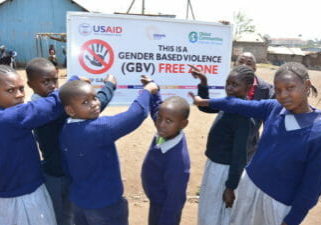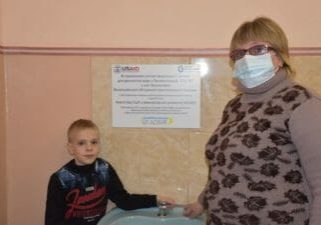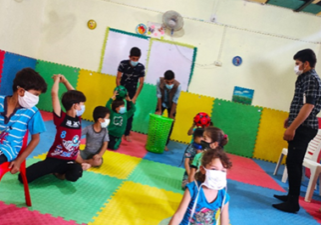News > Blog
Innovative Ghanaian Latrine Makes Sanitation Aspirational
Published 11/13/2017 by globalcommunities
Innovative Ghanaian Latrine Makes Sanitation Aspirational
By USAID Water Team | This article originally appeared on Medium.
Children at Ibrahim Memorial School gather with their teacher, Zainat Boye, in front of the school’s new Digni-Loo. The Digni-Loo was invented by Global Communities as part of the USAID WASH for Health program which is working to accelerate sustainable improvement in water and sanitation access and improve hygiene behaviors in 30 target districts throughout five regions of Ghana.
Ghana is a country of jarring contradictions. Technology is quickly infiltrating daily lives: nearly everyone has a mobile phone, the majority have access to electricity, and millions use the internet. But less than 15 percent of the country has access to basic sanitation, and one in five Ghanaians defecate in the open.
Anani Abeena from Taviefe-Dzefe village in the Volta Region says this is because the latrines available in rural villages like his are just not appealing. Abeena, a 54-year-old farmer and father of five, said household latrines are too expensive, difficult to maintain, and unpleasant to use. “There are a few household latrines around, but considering the bad odor and the number of flies that hover around them, that did not encourage me to get one,” he said. So, for most of his life, he opted to relieve himself in the bush.
Abeena is not alone: more than 800 million people worldwide still defecate in the open. This has resulted in billions of lost dollars from the global economy due to diarrheal illness and widespread threats to public health, including a heightened risk of global epidemics.
In early 2016, USAID piloted a new, more acceptable latrine in Ghana — it’s simple to install, affordable, comfortable, and easy to clean. The hope is that the new latrine, called the “Digni-Loo,” will make it more attainable and aspirational for millions like Abeena to stop defecating in the open.
Because it is made of plastic, the Digni-Loo is easier to clean, maintain, and keep free of smells and flies than traditional rural latrines. Photo credit: Seema Johnson/USAID
Seeking Sustainability
USAID’s Water, Sanitation, and Hygiene (WASH) for Health Project Director Alberto Wilde came up with the idea for the Digni-Loo after visiting villages across the country.
WASH for Health is a five-year USAID project that works throughout Ghana to improve access to water and sanitation. Its approach is centered around community-led total sanitation (CLTS). CLTS is a process in which local leaders educate their communities about the impacts of open defecation and mobilize them to build their own household latrines. Its goal is for communities to be certified open defecation free (ODF). This process has been successful — since 2015, WASH for Health has helped bring sanitation to 65,000 Ghanaians and assisted more than 250 communities to become ODF-certified.
While heartened by these successes, Wilde was concerned about their sustainability. “When I visited villages, I saw some communities that had been certified ODF-free in the past were now openly defecating again,” he said. “When I talked to community members, they said the issue was the latrines themselves.”
Wilde spoke to a number of individuals who, like Abeena, found latrines unappealing and difficult to keep clean. He even heard from community members who said rural latrines could be dangerous, because children would fall into their pits. “It is no wonder some resort to defecating in the open,” he said.
Wilde was determined to find a better alternative, one that would make open defecation free status easier for communities to attain and maintain. He researched products available both in and outside of the country, visited local factories and companies, and ended up partnering with Ghanaian plastic manufacturer Duraplast Ghana Ltd. He collaborated with Duraplast to produce a local product that addressed some of the villagers’ recurring complaints — something affordable, easy to install, hygienic, and durable.
Named the Digni-Loo because of the dignity it brings users, the latrine is made of plastic rather than cement. It consists of a plastic slab with a ventilation pipe attached to it. Unlike traditional cement latrines, it does not require professional installation. Instead, a household will dig a pit about 28 inches wide and at least seven feet deep, then insert the latrine so the slab lines up with the ground. When the pit fills up (generally in one to five years), this process can be repeated. Installation takes just 10 minutes.
Because the Digni-Loo is one solid piece of smooth plastic, it is easy to wash with soap and water, and is resistant to cracks that are common in traditional cement latrines, which can trap waste and smells. Additionally, the Digni-Loo has an automatic flap at the base of the shoot, which opens and closes easily depending on the waste or water being flushed into the pit. This flap keeps flies out of the pit, contains waste, and suppresses odors. The product is also more durable than other latrines because it is made of sturdy plastic thick enough to hold a lot of weight without disintegrating over time. In fact, it can last up to two decades. Moreover, it is cheaper than other latrines on the market — in Ghana, it costs less than a quarter of the price of the average rural latrine, 330 Ghanaian cedis (about $75) as opposed to up to 1,800 cedis ($412) for a traditional cement latrine.
A family works together to install their new Digni-Loo. The entire installation process only takes about 10 minutes. Photo credit: Melissa Burnes/Global Communities Ghana
A Promising Pilot
USAID’s team in Ghana knew a promising idea was not enough — the latrine would have to appeal to real people. So, in March 2016, WASH for Health piloted the Digni-Loo with 60 households. Based on the feedback from that pilot, the project fine-tuned its design and launched a second pilot with 450 households. This pilot is still ongoing, and is targeting a varied cross-section of people, including women, men, children, the elderly, and people with disabilities.
Initial responses have been positive. Stella Adzonyo, an elderly participant in the pilot who relies on a wheelchair, said she feels safer now than when she would use the bush. “Before, I would get diarrhea often. And sometimes, when I was using my wheelchair, I would fall and get bruises on my way to the bush. Also, I would encounter reptiles like snakes,” she said. “The Digni-Loo has changed my life.”
Gladys Dasi, a CLTS community leader for her village, said the Digni-Loo’s easy installation and maintenance will make it easier for communities to attain and maintain ODF status. “Plastic is the best!” she said of the Digni-Loo. “When it’s full it can be removed and put in another place. The appearance is attractive, it’s nice to look at, and digging the hole for it is so easy.”
Even Abeena, who also participated in the pilot, liked the Digni-Loo. “It is easy to clean, flies do not disturb, and there is no bad scent,” he said.
Stella Adzonyo sit in front of their Digni-Loo, which she said has changed her life. Photo Credit: Global Communities
Marketing Dignity
USAID held a commercial launch for the Digni-Loo in Accra in June 2017. The launch was a high-profile event, with top officials from the U.S. and Ghanaian governments, interactive demonstrations, and scores of media.
While the attendees celebrated, they acknowledged how much work was ahead of them. “Even groundbreaking hardware like the Digni-Loo is not a solution on its own,” said U.S. Ambassador to Ghana Robert P. Jackson at the launch. “Sweeping, sustainable change in Ghana will require millions of individuals to change their behavior.”
Indeed, behavior change is central to USAID’s approach to improving health. “We work with the Ghanaian government, the private sector, and above all, communities to educate people about the importance of sanitation and hygiene, so they can take ownership over their own health,” said USAID/Ghana WASH Project Management Specialist Emmanuel Odotei.
USAID is in the early stages of a large-scale marketing campaign targeting rural communities through radio advertisements — by far the most popular form of media in rural Ghana. WASH for Health is also setting up demonstrations at marketplaces and sending representatives door-to-door to educate households about the Digni-Loo.
To ensure the greatest impact on its overall WASH goals, USAID is working to target the most marginalized households in ODF-certified communities and looking into partnering with local entrepreneurs and small business owners to enable even the poorest Ghanaians to invest in a Digni-Loo.
Another way the project is spreading the word about the Digni-Loo is through CLTS. Local leaders and natural leaders are now providing Ghanaian communities with information about the Digni-Loo, as well as other latrines, as part of the CLTS process. “What’s great is that community members now have options and can choose what works best for them and their families,” said Wilde.
It is still early, but it looks as if the Digni-Loo could become a game changer in Ghana’s sanitation industry. Word of mouth is spreading in Ghanaian villages. “There’s been a lot of interest in our Digni-Loo from neighboring community members; they ask about the price and want to know how it works,” said Zainat Boye, a teacher at Ibrahim Memorial School, a nursery school that now has its own Digni-Loo.
If the Digni-Loo continues to be successful, USAID will partner with the private sector to introduce it throughout West Africa.
“Sanitation is one of the world’s most persistent development challenges, and there are no easy answers,” said Odotei. “But I believe that if we strategically partner to market the Digni-Loo to those who need it most, and continue to implement CLTS, it could play an important role in solving this health crisis.”






